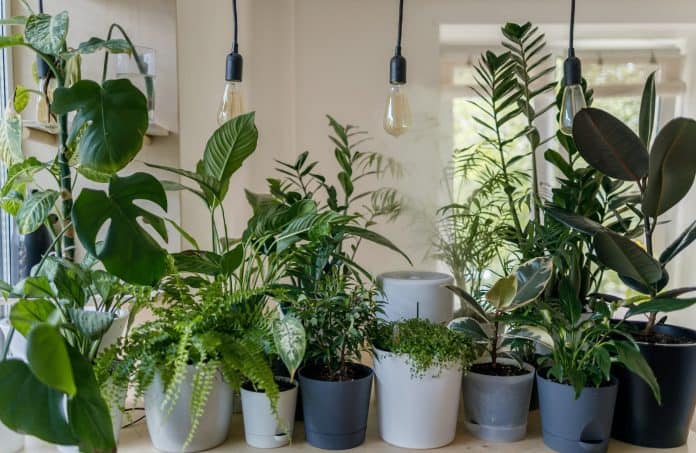The rise of houseplant popularity has been growing steadily for the last few years. Thanks to the covid-19 pandemic, this industry is now booming. People across all generations (but mostly millennials) have turned to indoor plants for comfort and a source of joy.
Plant Trends
Plants are cool now. There are thousands of social media accounts dedicated to plant care, showing off foliage collections, and stores showing off their meticulously organized inventory. With a few clicks you can purchase a new plant baby in an unbelievably trendy pot, have it shipped to your doorstep, and keep your collection growing.
However, filling your home from floor to ceiling with plants comes with dedicating a lot of time to care. Some varieties of indoor plants are almost indestructible, while others are extremely finicky and will try to commit ritual seppuku if a single aspect of their environment changes.
Care Necessities
It’s always a good idea to research new plants before purchasing. As you grow your collection, there are some basic care tips and products that will make you (and your plant’s life) better.
Drainage holes
This is rule number one—buy pots with drainage holes. No exceptions with this. Sure, that adorable ceramic dinosaur-shaped planter is great, but you know what isn’t great? Root rot. Drainage roles allow excess water to run through the container, preventing the pooling of water at the bottom of the pot. Pooling water can lead to the growth of fungus and bacteria, be a breeding ground for insects, and cause deadly root rot.
Some companies trying to cash in on the plant craze make interesting and cute planters without taking actual plant care into consideration. When shopping for a new planter, just walk away from the ones without drainage holes. Your plant babies will thank you.
Soil Moisture Meter
Determining a watering schedule for your plants can be tricky. Soil quality, planter material, the proximity to sunlight, and the season all factor in to how often you’ll need to water. It’s not as simple as giving them a drink once a week.
Over watering is often named as the number one killer of houseplants. You can solve this problem by using a moisture meter. These devices are cheap but helpful, taking the guesswork out of watering and even fertilizing schedules. Some moisture meters even measure soil pH and sunlight levels.
If you’re not that into additional gadgets, the cheapest tool for checking if your plants are thirsty is your finger. If the top inch or two of soil is dry, your plants are ready to be watered. Also, if you notice drooping leaves and stems, that’s another good indicator your plants desperately need a drink. If the top few inches of soil is still damp, hold off on adding more water.
Showering Your Plants
Showering your plants with love is great, but what about actually taking them into the shower? Yes, that’s right, your plants can benefit from a cleansing shower—especially after a long, dry winter.
Overtime dust and dirt can build up on leaves which can block their absorption of sunlight, messing with their ability to photosynthesize. Wiping leaves with a damp cloth can help prevent this buildup, but giving them a good showering has additional benefits. A light, tepid shower of water cleans leaves, can knock off pests, and help remove mineral build up inside pots.
After a dry winter, most plants will especially enjoy a hydrating soak in the shower. However, be careful not to shower or mist plants that don’t enjoy getting their leaves wet, like African violets or begonias.
Pest Control
A pest infestation is the absolute worst, but any experienced gardener will tell you it’s just part of the game. If you have a large collection of indoor plants, chances are you’re going to have to battle mealy bugs, fungus gnats, or spider mites at some point. These critters are most assuredly sent from the depths of the underworld with the intent to destroy everything we love. You can strengthen your defenses with these common weapons, er, pest control products.
- Neem oil – Every plant owner should have neem oil. Made from the Indian neem tree, neem oil and is a great, all-natural insecticide and fungicide. You can buy a concentrate to dilute with water, or a spray ready to use. Spritz infested stems, leaves, and soil once a week until pests have been vanquished.
- Diatomaceous earth – Diatomaceous earth is the best product for battling soil-based pests. This substance looks and feels like a super soft powder to us, but it’s actually made up of sharp, jagged granules. The particles are so small and sharp they can penetrate the joints and exoskeletons of insects, making this powder an incredibly effective pest control option. You can use diatomaceous earth against spider mites, fungus gnats, aphids, scale bugs, and pretty much any other common houseplant insect.
Grow Lights
Adding grow lights might seem like overkill, but more and more people are realizing how beneficial these lights can be—especially during the winter. As seasons change and the precious hours of sunlight get shorter, you might notice your plants looking less than ideal. What was once a perfect sunny spot in your home might now hardly get much light, which can lead to yellowing leaves and drooping stems. Setting up some simple lights can help combat this issue.
Spot or flood bulbs typically work the best at directing the most light towards your plants, and you don’t need to spring for the most expensive option to see results. Research has found using a basic LED bulb can have beneficial results for plant growth. Some brands even offer LED specific grow lights with adjustable color spectrum functions.


